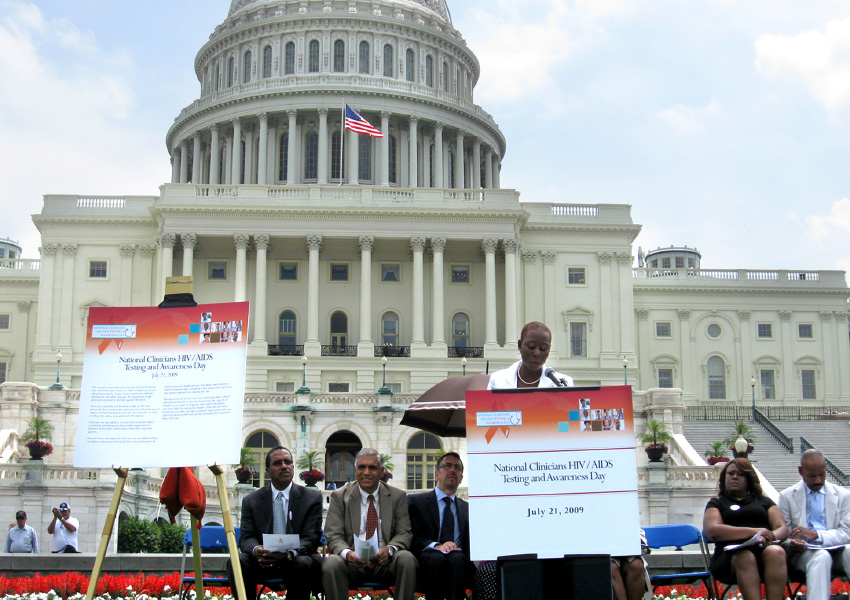
Across industries, Pratt alumni have been influential in reimagining and reshaping the way we live, responding to the challenges, needs, and questions of their times. Part three of six from Prattfolio’s feature on Pratt alumni leading the way in a changing world highlights Goulda Downer (B.S. Nutrition and Dietetics ’84): HIV/AIDS Vanguard.
When nutrition scientist and public health educator Goulda Downer met with her first HIV patient in the late 1980s, the disease was deadly. Not only was malnutrition—then Downer’s primary area of expertise—contributing to mortality, but the stigma of AIDS was creating life-threatening barriers to treatment. Downer has since led the charge in transforming HIV/AIDS care, through groundbreaking research, which unearthed links between diet and disease complications, and her efforts to reform the way providers approach patient care, especially in the communities of color hit hardest by the disease.
After studying nutrition science at Pratt, with an emphasis on nutrition as preventive care, Downer went on to complete her Ph.D. at Howard University in Washington, D.C., in 1988. It was a time and place where AIDS, having reached national epidemic status and with its origins only recently discovered, dominated the conversation in the medical and political communities. With her nutritional research background, Downer focused her work on the critical need for clean and complete nutrition for patients with HIV, for whom food contamination, malabsorption, and anorexia (loss of appetite) proved real threats. In 2003 she coauthored a seminal resource for clinicians, Food and Water Safety for Persons Infected with Human Immunodeficiency Virus.
The following year, as an estimated 1 million adults and children lived with HIV in North America and AIDS-related deaths were reaching their global peak, Downer returned to Howard University to lead the HIV/AIDS Consortium, an interdisciplinary group engaging in research, outreach, and other initiatives to combat the epidemic. There, her attention turned to addressing the cultural obstacles that compromised patient care.
Downer led an assembly of experts from a range of ethnic backgrounds to develop an influential training model called BESAFE (or Barriers to Care, Ethics, Sensitivity of the Provider, Assessment, Facts, and Encounters). “We spoke with patients and clinicians and found that one major contributor to disparities in HIV treatment and health was a lack of cultural competency,” she says. “Beliefs about disease, health, and perceived causes of sickness stem in part from an individual’s culture, and in order to be effective, health care services need to be responsive to, and respectful of, cultural and linguistic needs.”
The only model of its kind in the United States, BESAFE has been used to train more than 63,000 clinicians since its introduction in 2012.
The stigma related to HIV remains an enduring challenge, but Downer has worked to change attitudes, from the exam room to the public sphere. “Stigma from health care providers is a death sentence,” she says. “Stigmatizing behavior prevents individuals from coming in for testing and, equally important, prevents them from staying in care once they have tested positive. When my research unearthed that provider stigma was a driving force behind HIV disparity in our communities, we did not ignore it.”
Drawing on reports that showed Washington, D.C.’s, staggeringly high rate of HIV/AIDS compared to the national average, Downer petitioned the District’s City Council to require enhanced training for D.C. physicians, physician assistants, and nurses. Her appeal resulted in the passage of a bill that required providers in the District to complete continuing education credits in HIV/AIDS, beginning in 2014.
Meanwhile, Downer’s research has served as rationale for increased community-outreach-based testing services and spurred her to propose a National Clinicians HIV/AIDS Testing and Awareness Day, now entering its 10th year.
Last fall, Downer received the most recent of a number of honors for her contributions to HIV/AIDS care, which include the 2014 Congressional Black Caucus Health Brain Trust Leadership in Advocacy Award and Pratt’s own Alumni Achievement Award, when she was recognized by the Institute of Caribbean Studies for changing the way the clinical workforce serves the most vulnerable individuals and communities.
Originally published in “The Transformers” in Prattfolio (Spring/Summer 2017). Read the issue at www.pratt.edu/alumni.
Image courtesy of Goulda Downer